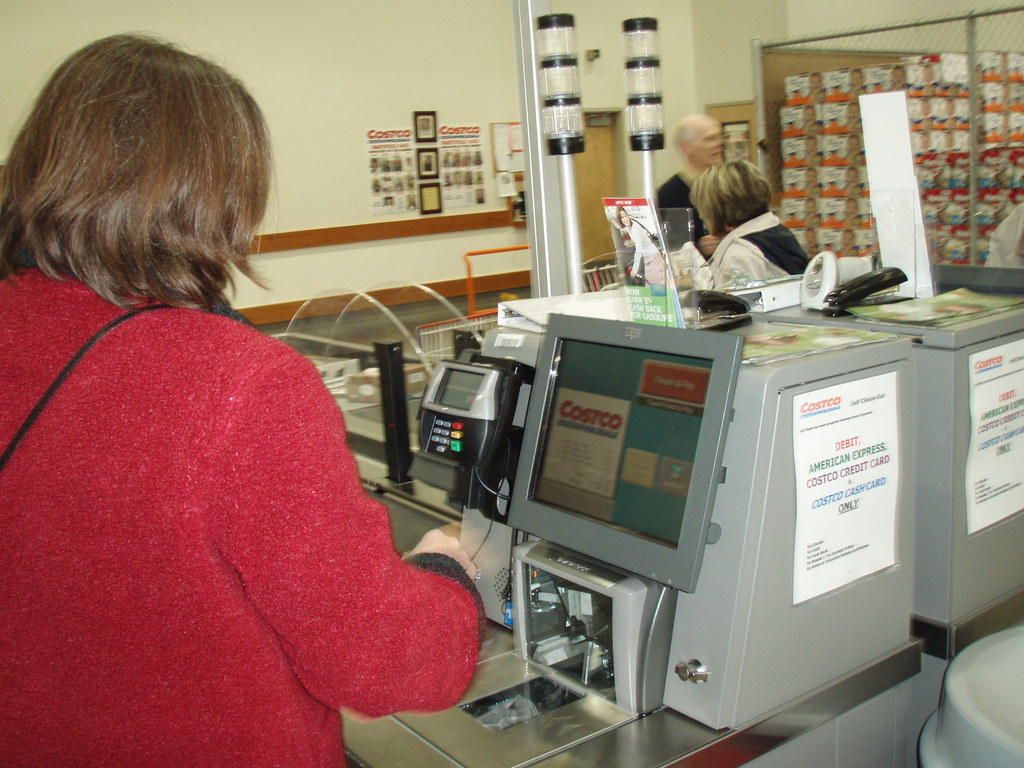Have you’ve seen a meme exhorting you not to use self-checkout because it impoverishes workers who are replaced by unfeeling scanners? There is no harm in making that choice. But if we remember our lessons from Frederic Bastiat, we can see why the rationale behind the campaign is absurd.
Why should we stop with the self-checkout? We would create more jobs if we didn’t even select our own groceries but instead hired personal shoppers to do it for us. To some extent this is what companies like Instacart and Shipt do already, but the shoppers aren’t charged with making all your decisions for you. They just pick up the groceries and drive them to your house–and maybe they even use the self-checkout.
We could go one better. Instead of driving yourself to the grocery store, you should take a chauffeured car. Or, if you really care about creating jobs, you should hire a team of people to carry you in a sedan chair and then a small army of assistants to carry your items one-by-one once you’ve shopped.
Of course not. Carrying a person several miles undoubtedly burns a lot of calories, which means you’ll have to spend a lot to maintain your retinue of assistants. This, in turn, will encourage the national labor as more farmers and retailers are required to produce the sustenance your assistants require. This creates loads of white-collar jobs, too, as you would no doubt need to provide health benefits for your assistants, have your sedan chair insured, and so on.
And then again, if you really, really cared about creating jobs, you would hire a mastication service to send someone to your house, chew your food for you, and then spit it into your mouth like a mother bird feeding its babies. You’re already willing to sacrifice convenience in the name of creating jobs. Is it too much to ask that you sacrifice hygiene and dignity?
Of course, this is absurd. You’re not spreading prosperity when you choose the labor-intensive option just because it’s labor intensive. You’re actually wasting resources.
If we really cared about jobs for cashiers and baggers, we’d do away with rules that make labor more expensive. A lot of the benefit of a bad job at a low wage is that it provides invaluable labor market experience and, perhaps, connections that might help you succeed later. The rich and the middle class don’t need low-wage jobs as much because they are likely embedded in denser networks that can provide them with connections and opportunities to shake hands with influential people. The poor aren’t so lucky.
You should save time and money by using the self-service checkout kiosk if that’s what works for you, and do so guilt-free. If you’re worried about people losing jobs as a result, don’t.
A quick search turned up this 2017 claim that millennials spent $237 per month on groceries. Go ahead and assume that’s accurate, and assume that these millennials save 1% on their grocery bill every month thanks to the self-checkout. That comes to just about $25 a year. It doesn’t sound like much, but what would you do with an extra $25? Here are a few options that will help you see how you’re not “destroying jobs” by using the self-checkout–and conversely, how you’re not “creating jobs” by conspicuously wasting money and other valuable resources:
First, you could take that $25 and you could spend it. This much is obvious. Maybe you get another haircut and create an opportunity for a cosmetologist to pick up a few extra dollars.
Second, you could save it. By leaving the $25 unconsumed, you leave it for someone else to borrow and put to productive use. Your individual $25 might not be that important, but when a banker pools it with a bunch of other people’s $25 in additional savings, it might be enough to finance a productive venture like a sports bar or a lawn service or new hotel construction.
Third, you could light it on fire. Actually, destroying US currency might bring criminal penalties, so perhaps you could do something less severe, like sticking it in a mattress or burying it in the yard. Congratulations: you’ve just made prices lower for everyone else and redistributed your personal wealth equally by making everyone else’s dollars just a bit more valuable.
As an economist, I can’t tell you exactly what to do. I don’t know your values, preferences, and so on. I can, however, tell you that if you’re conspicuously wasting resources, then you’re doing just that: wasting resources. So don’t give in to social pressure, use the self-checkout if you wish, and don’t lose any sleep over what your friends are sharing in their social media feeds.
Speaking of Social Media, I was inspired here by something Steve Horwitz shared. If you really want to learn economics from memes, I humbly suggest my page Economics in One Meme.
—
This article was republished with permission from the American Institute for Economic Research.
Dear Readers,
Big Tech is suppressing our reach, refusing to let us advertise and squelching our ability to serve up a steady diet of truth and ideas. Help us fight back by becoming a member for just $5 a month and then join the discussion on Parler @CharlemagneInstitute and Gab @CharlemagneInstitute!
Image Credit:
Flickr-TheKirbster, CC BY 2.0
















Leave a Comment
Your email address will not be published. Required fields are marked with *